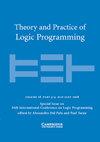Constraint Answer Set Programming: Integrational and Translational (or SMT-based) Approaches
IF 1.1
2区 数学
Q3 COMPUTER SCIENCE, SOFTWARE ENGINEERING
引用次数: 4
Abstract
Constraint answer set programming or CASP, for short, is a hybrid approach in automated reasoning putting together the advances of distinct research areas such as answer set programming, constraint processing, and satisfiability modulo theories. CASP demonstrates promising results, including the development of a multitude of solvers: acsolver, clingcon, ezcsp, idp, inca, dingo, mingo, aspmt2smt, clingo[l,dl], and ezsmt. It opens new horizons for declarative programming applications such as solving complex train scheduling problems. Systems designed to find solutions to constraint answer set programs can be grouped according to their construction into, what we call, integrational or translational approaches. The focus of this paper is an overview of the key ingredients of the design of constraint answer set solvers drawing distinctions and parallels between integrational and translational approaches. The paper also provides a glimpse at the kind of programs its users develop by utilizing a CASP encoding of Traveling Salesman problem for illustration. In addition, we place the CASP technology on the map among its automated reasoning peers as well as discuss future possibilities for the development of CASP.约束答案集规划:集成和转换(或基于smt的)方法
约束答案集规划或简称CASP,是自动推理中的一种混合方法,将不同研究领域的进展结合在一起,如答案集规划、约束处理和可满足模理论。CASP展示了有希望的结果,包括大量求解器的开发:acsolver、clingcon、ezcsp、idp、inca、dingo、mingo、aspmt2smt、clingo[1,dl]和ezsmt。它为声明式编程应用程序(如解决复杂的列车调度问题)开辟了新的视野。设计用于寻找约束答案集程序的解决方案的系统可以根据其结构分为我们所说的集成或转换方法。本文的重点是概述了约束答案集求解器设计的关键成分,并在整合和翻译方法之间建立了区别和相似之处。本文还以旅行推销员问题的CASP编码为例,简要介绍了用户开发的程序类型。此外,我们将CASP技术置于其自动推理同行的地图上,并讨论了CASP发展的未来可能性。
本文章由计算机程序翻译,如有差异,请以英文原文为准。
求助全文
约1分钟内获得全文
求助全文
来源期刊

Theory and Practice of Logic Programming
工程技术-计算机:理论方法
CiteScore
4.50
自引率
21.40%
发文量
40
审稿时长
>12 weeks
期刊介绍:
Theory and Practice of Logic Programming emphasises both the theory and practice of logic programming. Logic programming applies to all areas of artificial intelligence and computer science and is fundamental to them. Among the topics covered are AI applications that use logic programming, logic programming methodologies, specification, analysis and verification of systems, inductive logic programming, multi-relational data mining, natural language processing, knowledge representation, non-monotonic reasoning, semantic web reasoning, databases, implementations and architectures and constraint logic programming.
 求助内容:
求助内容: 应助结果提醒方式:
应助结果提醒方式:


